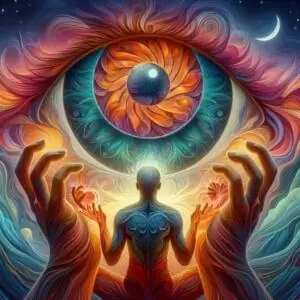Welcome to our article on how to embrace vulnerability and its profound impact on personal growth and authentic connections. In a world that often emphasizes strength and invulnerability, we invite you to explore the transformative power of embracing your vulnerabilities.
While vulnerability may initially seem daunting, it is in this state that we can truly connect with ourselves and others on a deeper level. Embracing vulnerability means acknowledging our fears, insecurities, and imperfections without judgment. It is about being authentic and allowing ourselves to be open and seen.
Contrary to popular belief, vulnerability is not a sign of weakness. It is a profound act of courage. By embracing vulnerability, we step into our truth and create opportunities for growth, resilience, and genuine connections in our lives.
Throughout this article, we will dive into the meaning of embracing vulnerability and uncover the barriers that prevent us from fully embracing it. We will also explore the incredible benefits that await those who choose to embrace their vulnerabilities.
So, join us on this journey as we unravel the power of vulnerability and discover how it can lead to a more authentic and fulfilling life. Embrace vulnerability, embrace growth, and unlock your true potential.
Understanding Vulnerability: Breaking Down Barriers
As we continue our exploration of embracing vulnerability, it becomes crucial to gain a deeper understanding of what vulnerability truly entails. It is not merely about displaying weakness or seeking sympathy; instead, it is a powerful tool that allows us to connect with others authentically and foster personal growth.
In order to embrace vulnerability, it is essential to identify and break down the barriers that prevent us from doing so. These barriers can range from societal norms and expectations to personal fears and insecurities. By acknowledging and addressing these barriers, we can create space for vulnerability to thrive in our lives.
The Importance of Self-Awareness
Self-awareness plays a fundamental role in embracing vulnerability. It involves recognizing our emotions, thoughts, and behaviors, and understanding how they shape our interactions with ourselves and others. By being in tune with ourselves, we can develop a deeper understanding of our vulnerabilities and begin to accept them.
Self-awareness allows us to recognize the masks we wear and the walls we build to protect ourselves from being vulnerable. It empowers us to break free from societal expectations and embrace vulnerability as a strength rather than a weakness. It is through this self-awareness that we can find the courage to be authentic and open with ourselves and those around us.
Overcoming Societal Norms and Expectations
Society often discourages vulnerability, promoting an image of strength rooted in self-reliance and invulnerability. However, true strength lies in our ability to embrace our vulnerability and connect with others on a deeper level.
We can overcome societal norms and expectations by challenging the belief that vulnerability equates to inadequacy. By reframing vulnerability as a courageous act of authenticity, we can reshape our perception and invite vulnerability into our lives. It is through this shift that we can establish genuine connections and foster a sense of belonging.

Embracing vulnerability is a transformative journey that requires self-reflection, courage, and a willingness to let go of fear. By understanding the barriers that prevent us from embracing vulnerability and actively working towards overcoming them, we pave the way for personal growth and authentic connections.
The Benefits of Embracing Vulnerability
Embracing vulnerability can bring about transformative changes in our lives, leading to deeper connections, personal growth, increased resilience, and an enhanced sense of authenticity. By allowing ourselves to be vulnerable, we open the door to profound experiences and meaningful relationships.
One of the key benefits of embracing vulnerability is the ability to form deeper connections with others. When we open ourselves up and share our authentic selves, we create an atmosphere of trust and understanding, enabling others to do the same. These genuine connections foster a sense of belonging and support, enhancing our overall well-being.
In addition to cultivating meaningful relationships, embracing vulnerability also allows for personal growth. It is through vulnerability that we confront our fears and step outside our comfort zones. By embracing our vulnerabilities, we challenge ourselves to grow, learn, and evolve as individuals. It is in these moments of vulnerability that we discover our true strengths and capabilities.
Vulnerability also contributes to increased resilience. When we embrace vulnerability, we develop resilience to setbacks and adversity. By acknowledging that vulnerability is a natural part of the human experience, we become better equipped to handle difficult situations. We learn to navigate challenges with authenticity and compassion, growing stronger with each experience.
Furthermore, embracing vulnerability nurtures an enhanced sense of authenticity. When we embrace our vulnerabilities, we embrace all aspects of ourselves – the imperfect, flawed, and beautiful parts. This self-acceptance allows us to live authentically and aligned with our values. We no longer feel the need to hide or pretend, resulting in a greater sense of fulfillment and purpose.
Embrace vulnerability and unlock a world of growth, connection, resilience, and authenticity. Dare to be vulnerable, for it is in these moments that we truly come alive.

Conclusion: Embrace Vulnerability
In conclusion, embracing vulnerability is not a sign of weakness but rather a powerful path to personal strength and growth. When we acknowledge and embrace our vulnerabilities, we open ourselves up to a world of authentic connections and a more fulfilling life.
Embracing vulnerability means allowing ourselves to be seen and heard, even when it feels uncomfortable or scary. It requires us to let go of perfectionism and the need to always have it all together. Instead, we choose to show up as our true, imperfect selves, accepting that vulnerability is an inherent part of the human experience.
By embracing vulnerability, we create space for genuine connections to flourish. It allows us to deepen our relationships with others as we cultivate empathy, compassion, and understanding. We become more authentic in our interactions, breaking down the barriers that hinder true connection and fostering an environment of trust and openness.
So, let’s embark on this transformative journey together. Let’s embrace our vulnerabilities, celebrate our imperfections, and honor the courage it takes to show up as our true selves. By doing so, we can live a life that is true to our values and experience the profound growth and fulfillment that comes with embracing vulnerability.











